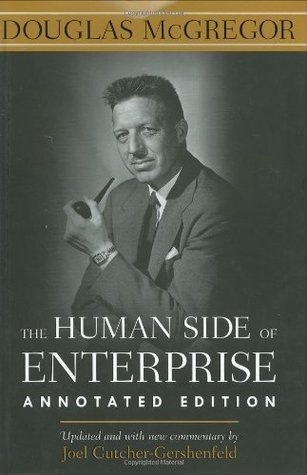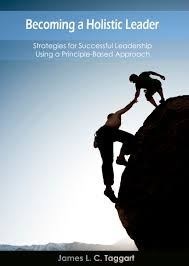Back to the Future: Are You a Theory Xer or Yer?

Perhaps in a contemporary sense, yes. However, as the world evolves so too must those in leadership and managerial positions. New ideas and concepts will always be critically important to organizations and more broadly society as new technological, geo-political and environmental challenges present themselves.
It’s informative and reflective to occasionally look back in time to earlier concepts and writings on leadership and management. This meant re-reading of some of the more substantive writers on these two inter-related fields. So let’s take a look at Douglas McGregor, who wrote the acclaimed “The Human Side of Enterprise” in 1960 (I was five years old at the time living in Battle Creek, Michigan). In this post, Theory X and Y are briefly described, followed by highlights of some of McGregor’s observations 57 years ago.
The way in which managers interact with their subordinates is based on their assumptions about human behaviour. These assumptions (mental models) begin to be formed when we’re young, and as we age our various experiences further solidify them further. Organizations posses their own cultures, which are either sustained by passing down managerial assumptions and practices to new managers, or they are blown apart by new renegade CEOs who wish to recreate their organizations.
McGregor described the assumptions underlying Theory X as:
1) People have an inherent dislike of work and will avoid it
2) Because of this dislike for work, people must be ‘coerced, controlled, directed, threatened with punishment’ to get them to perform
3) People prefer to be directed in their work, shunning responsibility and ambition
He believed that these assumptions were not a theory but in reality determined management strategy in organizations. It was about the ‘tactics’ of control and telling people what to do in order to achieve organizational objectives.

1) People do not inherently dislike work, instead seeing it as a source of satisfaction, depending on the conditions
2) People will direct themselves in working towards organizational objectives, once they have committed to them
3) Committing to these objectives is directly related to the rewards associated with achieving them
4) Under the right conditions, people will not only accept responsibility but seek it out
5) People will usually exercise a high degree of creativity in attempting to solve organizational problems
6) The intellectual capacities are only being partially used in organizations
One of the more compelling sections in his book is on the climate of relationships. McGregor provides the example of a factory superintendent who was known for screaming and swearing at his men. He gives this boss the title ‘bull of the woods.’ The paradox here is that the personnel people, who were carrying out training for managers at the time, couldn’t understand why a manager who operated in this manner could still be highly respected by his staff. Sound crazy? Well, morale and productivity were at high levels in this factory.
Although the superintendent was tough it was in reality superficial. He demonstrated consistently his concern for the welfare of his staff, going so far as to helping those who needed some financial help until payday or others who had a family crisis. He was exceedingly fair in how he treated his subordinates, and in particular solidly backed them when he felt that management was not being fair. An example is when he resigned and walked out of his superior’s office when senior management would not back down on an issue. Management chased him out to the parking lot and immediately capitulated.

McGregor makes another key observation, noteworthy because he’s addressing organizations in the late 1950s yet it’s highly relevant today. It’s the ‘P’ word – participation, a concept that became very popular in the nineties and which has resurfaced with Generation Y’s entry into the job market. When management uses the façade of participation to get employees to accept key decisions, and when used repeatedly, the result is cynicism and checking-out from further participatory exercises. As he states: “…[management] will lose far more than [it] had hoped to gain by ‘making them feel important.’”
McGregor’s work may seem dated in today’s service-oriented economy, combined with technology’s impact on how work is performed and where. In particular, the increased diversity of the workforce with women’s higher participation rate and people from different countries and cultures is changing the practice of managerial leadership. However, Theory X and Theory Y still provide a useful framework on which to study the intertwined fields of management and leadership.
Take a moment to share your views and experiences.
What would you identify as the most important things that managerial leaders must attend to if they wish to be effective in their jobs?
If you consider yourself a leader, be sure to check the rearview mirror regularly to ensure you have followers. (James Taggart)
____________________________________________________________________________________________________

""""
Articles from Jim Taggart
View blog
The human race is an odd species. Adaptive to immediate threats and catastrophes, we as humans have ...

Date Line: 1994, · Forbes Magazine · THE NEW POST-HEROIC LEADERSHIP ”Ninety-five percent of American ...

In my last post I talked about building team performance. Today, we look at what kind of team player ...
You may be interested in these jobs
-
cabinetmaker
Found in: Talent CA 2 C2 - 12 hours ago
GHBRAR CARPENTRY LTD Edmonton, CanadaEducation: Secondary (high) school graduation certificate · Experience: 1 to less than 7 months · Tasks · Study plans, specifications or drawings of articles to be made · Trim joints and fit parts and subassemblies together to form complete unit and reinforce joints · Sand wooden ...
-
Senior Bodily Injury Examiner
Found in: beBee S2 CA - 2 weeks ago
Curo Claims Services Inc. Waterloo, Canada Full timeCompany Description · Who We Are · With every job, there's always the question of "why". Why join a company? Why be part of their mission? Here, the why is easy. It's because at some point, we've all needed someone there for us. · At the OTIP Group of Companies (OGC), we believe ...
-
administrative assistant
Found in: Talent CA 2 C2 - 4 days ago
Choice International Consulting Burnaby, CanadaDurée de l'emploi: Permanent · Langue de travail: Anglais · Heures de travail: 35 hours per week · Education: · Expérience: · Education · College/CEGEP · Work setting · Consulting firm · Tasks · Arrange and co-ordinate seminars, conferences, etc. · Establish and implement polic ...



Comments